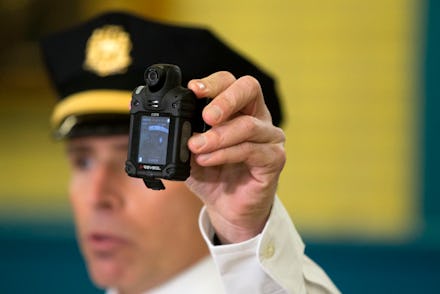One State Is About to Turn Police Body Cameras Into Nothing More Than Empty Gestures

Missouri.
After unarmed Ferguson, Missouri, teenager Michael Brown was killed under unclear circumstances by a local police officer in August 2014, wearable police body cameras were touted as a technical solution to increase the transparency of police forces.
In Missouri, lawmakers have already proposed legislation that would require law enforcement agencies to purchase and use the new equipment. But a Republican-sponsored bill might prevent this technology from ever being as effective as some might hope.
What's being proposed: ThinkProgress reports that the bill introduced by Republican state Sen. Doug Libla would make all footage recorded by police officers exempt from Missouri's open records law, as well as prevent the state from requiring cops to use the body cameras.
In other words, even if police officers' body cameras provide a clear account of an event, they wouldn't necessarily have to make that clear account public. Mic reached out to Libla's office for comment but did not hear back at the time of publication.
Similar measures are supported by Missouri Attorney General Chris Koster, a Democrat who believes the footage shouldn't be freely accessible to the public.
Other states: Missouri isn't the only place where privacy concerns are hampering the rollout of the cameras. In Minnesota, a bill sponsored by three former police officers turned state legislators would prevent videos from being seen by anyone but those recorded and require all footage not being used in an investigation to be destroyed.
In Los Angeles, where the police department will soon roll out 7,000 body cams for monitoring everyday police activity, police Chief Charlie Beck raised similar concerns. The Los Angeles Times reported that Beck told a community meeting there should be a "moral prohibition" on sharing body camera footage, elaborating that "victims call us when they've had horrific things done to them by evil people. And to make those things public revictimizes them, doesn't serve justice. And I don't think it's the right thing to do."
How effective are body cameras? The cameras are intended to ensure police officers are held accountable for their actions and members of the public have records to back them up when things go wrong. In a much-vaunted trial in Rialto, California, use of force and complaints against officers plummeted in February 2012 when 70 of its police officers were ordered to begin using the cameras. In 2014, video footage led to the exposure of police brutality incidents in Baltimore and Columbia, South Carolina.
But if the public isn't able to view video records of police activity captured by the body cameras, then they will fail to serve their intended purpose of increasing the transparency of police forces.
"The point of body cams is to protect the public and the police by providing a great level of transparency when it comes to police/public interactions," Sarah Rossi, director of advocacy and policy for the American Civil Liberties Union of Missouri, told Mic via email. "Closing the recordings to the public flies in the face of that goal by attempting to shield these public records from Missouri's sunshine law."
"The ACLU has been working with legislators to try and craft body cam legislation that would allow for the use of cameras while also addressing privacy and confidentiality concerns. Investigations could greatly benefit from footage obtained by body cameras. There are policies that can coincide with use of cameras that limit the burden on law enforcement and records offices while also respecting the public's right to know."
For example, Drone Free St. Louis representative John Chasnoff told the St. Louis Post-Dispatch that police could inform people that they were being recorded, ask permission before recording at crime scenes in private residences or prohibit recording strip searches or other potentially embarrassing law enforcement actions. Officers could also simply not release any recordings until the conclusion of an investigation.
Room to be skeptical: Police may be concerned about privacy, but they could also be using that pretext to keep police footage out of the hands of a highly critical public. Preventing the state from requiring police forces to use body cameras would essentially prevent reform.
Dennis Kenney, a John Jay College of Criminal Justice professor and former police officer, told the Los Angeles Times that giving police the power over which footage to release and when "destroys the whole purpose of having the video." University of South Carolina criminology expert Geoffrey Alpert added that since anyone can record in public, it's unclear why police recordings would get treated with particular deference.
Legislators looking to protect the public could simply ensure that body cameras are used in responsible ways rather than preventing them from being deployed in the first place. ACLU senior analyst Jay Stanley argued in a blog post that officers should simply be required to record all "stops, frisks, searches, arrests, consensual interviews and searches, enforcement actions of all kinds and any encounter that becomes in any way hostile or confrontational."
h/t ThinkProgress